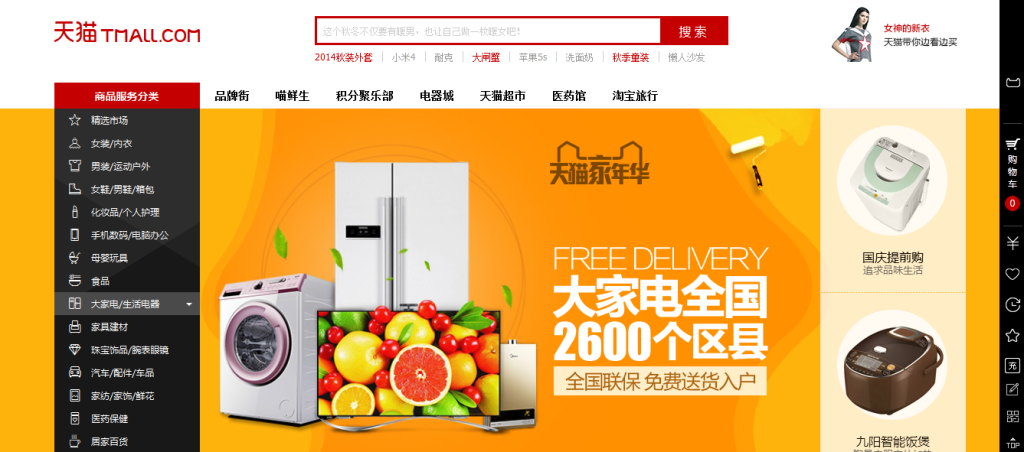 China’s huge consumer market is now attracting more and more foreign companies to take control of their distribution and manage their own retail sales.
China’s huge consumer market is now attracting more and more foreign companies to take control of their distribution and manage their own retail sales.
China has historically been an ideal destination for outsourcing manufacturing operations. Rogier van Bijnen and Maarten Roos of R&P China Lawyers discuss the legal challenges of this strategy and how China’s rule of law may affect many trying to set up shop.
The pull of China’s consumer market cannot be understated. Even manufacturing companies who do not conduct retail sales anywhere else in the world are being attracted by the dazzling numbers offered by China’s (online) market. Initially many used B2B solutions, leaving Chinese distributors to sell direct to consumers. However, while this solution provides easy market entry, margins are thin and companies have no direct influence over marketing strategies. Now, numerous third-party online platforms, like Tmall (B2C), Taobao (C2C) and Alibaba (B2B), and the possibility of cheaply outsourcing delivery to logistics companies make setting up online retail operations in China seem easy. But is it?
Online selling: go local
China is at the forefront of online sales. In big cities, many middle-class consumers already purchase most of their consumables through the Internet. This presents two main options for foreign companies that do not wish to invest huge sums in brick-and-mortar stores: sell through a Chinese third-party platform, or develop one’s own website in China.
Using a website outside of China is generally not recommended for a number of reasons predominantly established in law. Chinese consumers usually do not have foreign-currency credit cards, and so to avoid foreign-exchange restrictions a company would have to deal with expensive intermediaries. Also, delivery may be hampered by customs due to import restrictions and may be subject to import duties, plus the Great Chinese Firewall that protects Chinese Internet users will markedly slow traffic. If you really want to penetrate the Chinese market, you need to go local.
Third-party platform
The easiest way to sell online to Chinese customers is by operating a (web)shop on a third-party platform such as Tmall, JD.com (B2C), Alibaba or Taobao. Chinese customers are very familiar with buying on these websites, so there is already plenty of traffic, and the platforms are perceived as being reliable.
Before you can even think about selling online, you need to have your brand registered in China. None of the third-party platforms will allow anyone to open shop without a secure brand. This is the rule of law at work: since the amendment of the PRC Trademark Law (effective May 2014), parties who facilitate infringement may be held accountable.
Although officially no Chinese legal entity is needed to sell online in China, some of the platforms do require it (e.g. Tmall). We usually recommend this anyway, since importing goods and transactions with Chinese logistics providers are all much easier through a trading WFOE (wholly foreign-owned enterprise). This can be either a new WFOE or one that already exists and is engaged in other activities. Whether, in case of the latter, an expansion of the business scope is necessary depends on the proposed activities and the existing business scope. For example, as online sales is deemed an extension of a company’s sale activities on the Internet, a duly licensed and registered foreign-invested manufacturing or commercial company may directly engage in online sales without specifically adding ‘online sales’ to its business scope.
Additionally, if the merchandise is imported, the WFOE needs an import licence and the relevant products should meet the Chinese legal standards that apply to such products (e.g. product licensing, packaging and labelling standards, which also must be in Chinese). These rules are applied with increasing strictness, so companies for which a smooth completion of Customs procedures is important should prepare in advance to ensure they fully understand all procedures and requirements.
Online payment, warehousing and delivery are usually outsourced. Delivery is not only difficult to organise but also subject to specific licences (as a transportation company), and to date no foreign company has obtained a licence to handle online payment in China.
Owning your website
To operate a website in China, you need an Internet Content Provider (ICP) license from the Ministry of Industry and Information Technology (MIIT). An ICP licence for ‘commercial’ purposes is very difficult to obtain for foreign investors. Unless you are Amazon, forget about getting an ICP licence to set up a third-party platform to compete with Alibaba (and even Amazon did it with a 49 per cent joint venture, since a foreign majority stake is not permitted).
On the other hand, if a company only sells its own products through its own website, then under China’s legal definitions such a website is deemed to be ‘non-commercial’. In this case only a filing with the MIIT is required to obtain the ICP licence and no prior approval is needed (yes, a flexible rule of law can sometimes be an advantage). But only legal entities incorporated in China are eligible to obtain an ICP licence, so you would need to set up a trading WFOE to establish a local website within the Great Firewall.
Offline selling: stores
For larger companies, establishing one’s own retail network of brick-and-mortar stores is not only the best way to reach consumers, but it is often also part of the branding and marketing strategy. Allowing consumers to come in and touch the products before buying online is a concept that has been proven to work very well in the Chinese market.
The business scope of the Chinese headquarters of a retailer generally includes both wholesale trading and retail (which automatically includes online sales). The main office can be established at a retail outlet, but larger retailers generally prefer to establish the WFOE in an office building, and then establish each retail store as a branch (it is not permitted to operate multiple stores under one WFOE; each new location requires a separate branch). Alternatives are to use a franchise model, sell through store-in-store concepts or use commercial partnerships.
China’s geography also plays a role. Large retailers generally wonder whether they should be establishing one WFOE with branches all over the country, or whether it is beneficial to have WFOE’s in major geographical areas (e.g. Beijing, Shanghai and Guangzhou/Shenzhen) under which to structure the individual outlets. From a tax perspective there may be benefits to having more WFOE’s, though this must be weighed against the additional administration as well as relative complexity in finance and governance.
General procedures for branch establishment
Each new store opening starts with finding the right location and subsequent negotiations with the landlord. It is currently a seller’s market—demand for the best locations is extremely hot—and so these negotiations are never going to be easy. Moreover, landlords generally do not shy away from using loopholes in lease contracts to get a tenant out if they can get a better deal with someone else, so make sure your contract is properly negotiated. We also see that more and more landlords require evidence that the store’s brand has been properly registered, mainly for two reasons. The landlord will be assured by a stable intellectual property (IP) situation, and will want to avoid any risk that it is facilitating the trademark infringement of others.
Once a lease contract has been signed (and all documents required from the landlord have been obtained), your lawyers can proceed to establish the branch. The formal set-up is not complicated, but obtaining the various licences can be time-consuming, especially in second- and third-tier cities, and strict coordination with the landlord regarding the required documentation and licences of the premises is an absolute necessity. The good news: since 13th August, 2014, the Public Place Hygienic Licence can be obtained after establishing the branch, instead of before (note that not every city requires this licence, and the criteria may vary per city). This means the licence can be obtained simultaneously with several other post-establishment steps (e.g. tax registration), thus reducing delays when setting up a new store.
R&P China Lawyers (rplawyers.com) is a boutique firm with about 20 PRC licensed lawyers in Shanghai and Beijing. R&P assists international clients doing business in or with China, advising on corporate/M&A, commercial contracts, IP, employment and dispute resolution. As a PRC law firm, R&P is allowed to advise on Chinese law and represent clients in Chinese courts, and its foreign management ensures clients receive service and advice that is up to international standards. Clients operate throughout China across a broad range of industrial sectors.




Recent Comments